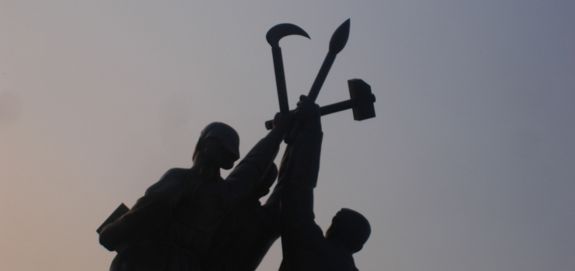As readers will recall, Kim Young Hwan’s initial outward
expression of ideological conversion came in an April 1995 piece for the
subversive leftist magazine Mal (lit. “Speech”). Entitled
“Anti-Americanism, North Korea, and My Thoughts on the 1990s,” Kim pointed
out in the piece that not only was South Korea not by any reasonable measure a
colony of the United States, but that the atmosphere inside North Korea also did
not allow for free study or critique of Workers’ Party theory. He cautioned against a madness into which he himself had fallen, declaring:
We should love our
North Korean brethren with a genuine passion, but never fall into blindly
following North Korea.
This was the first moment in which the leader of the underground
vanguard movement in South Korea came out publicly against the authorities in Pyongyang, and it led the North to dispatch an agent to assess Kim’s real intentions. There was still some cause for doubt at the time, but it would soon dissipate as the truth
of Kim’s new stance became overwhelmingly
clear.
 “When the world changes, the spirit of the time must also change.” | Image: Destination Pyongyang |
Eight months later, he made another incendiary assertion: speaking in the January 1996 edition of the bulletin of the youth organization Pureun Saram-deul, he proclaimed that the
world had changed, and therefore the spirit of the times – the Zeitgeist – too must change. Whereas in
the past it may have been social systems or social structures that limited social progress, he
said that now it is the person him or herself who must change. Speaking in Juche-ist terminology that Hwang Jang
Yop would have appreciated (Hwang was still in North Korea at the time), he said that the primary goal ought to be changing and developing the individual.
Kim’s public comments led to vibrant, often agitated debate. Jung Dae Yeon of the Ulsan Coalition for Democratic National Unification soon went public with his criticism. In the second edition of Jaju-ui Gil [“The Road to Autonomy”], published by the Council of Korean Democratic Youth Organizations, he declared that one must not in fact change one’s principles even as the world changes. (Jung was true to his word, and would be jailed in 1998.)
In 1997, Kim addressed his concerns directly to the party itself. He penned a letter to Ha Young Ok, Jo Yu Sik, and his other core comrades in the underground movement. The precise wording
of this missive has been lost to history, but it’s thrust was simple:
The North Korean government is not on the side of the people. It opposes them. As revolutionaries it is our primary duty to stand up and fight
on the side of the people. A revolution in North Korea is of vital importance;
it must be achieved right now. I must work for the overthrow of the Kim
Jong Il regime, which starves and oppresses its people.Come. Join me.
Some recipients of the message responded well to Kim’s entreaty; others flatly rejected it. With a schism that was now entirely irresolvable, in July the same year the three-man Central Committee of the NDRP met in a restaurant in central Seoul, whereupon a motion was tabled to dissolve it completely. The motion passed on a two-to-one majority: only Ha Young Ok wanted to keep going.
 The June 1999 edition of Chosun Monthly, in which Kim Young Hwan proposed a bipartisan coalition to work toward the overthrow of the Kim Jong Il regime. | Image: Destination Pyongyang (from original) |
Free of the strictures of the party he had established, Kim’s criticism of North Korea intensified. In the May
1998 issue of Mal, he wrote a
stunning refutation of almost all his former beliefs: “North Korea’s Suryeong Theory Is a Total
Fabrication and a Great Fraud.“ In it, he talked in
stark terms about the severity of North Korean governmental repression and the pervasive fear that dominated the country. He directly and personally criticized
Kim Il Sung and Kim Jong Il, and declared the complete severance of his
formal links with the Kim regime.
Kim took yet another stride forward in an interview in the June 1999 issue of
Chosun Wolgan [“Chosun Monthly,” by the publisher of the conservative daily Chosun Ilbo]. In it, he said: “I propose a grand coalition of left and right to overthrow the Kim Jong Il regime. The further to the [political] left one is,
the more one must lead this process.” He went on:
My fatal mistake was to spread a pro-North Korea atmosphere in the student activist movement; this was the decisive role I played. But with Hwang Jang Yop’s defection [in February 1997], the Juche idea has been completely split off from the North Korean system. Kim Jong Il’s feudal
dynastic regime is the enemy of Juche.Anyone who can look at the
cruel reality of the 20 million North Korean people and still think that there
is something else more important; well, that person’s blood
and tears are dry- they can’t tell what is up from what is down […] I will devote my
one and only life to the overthrow of the Kim Jong Il regime.
To be continued…

















